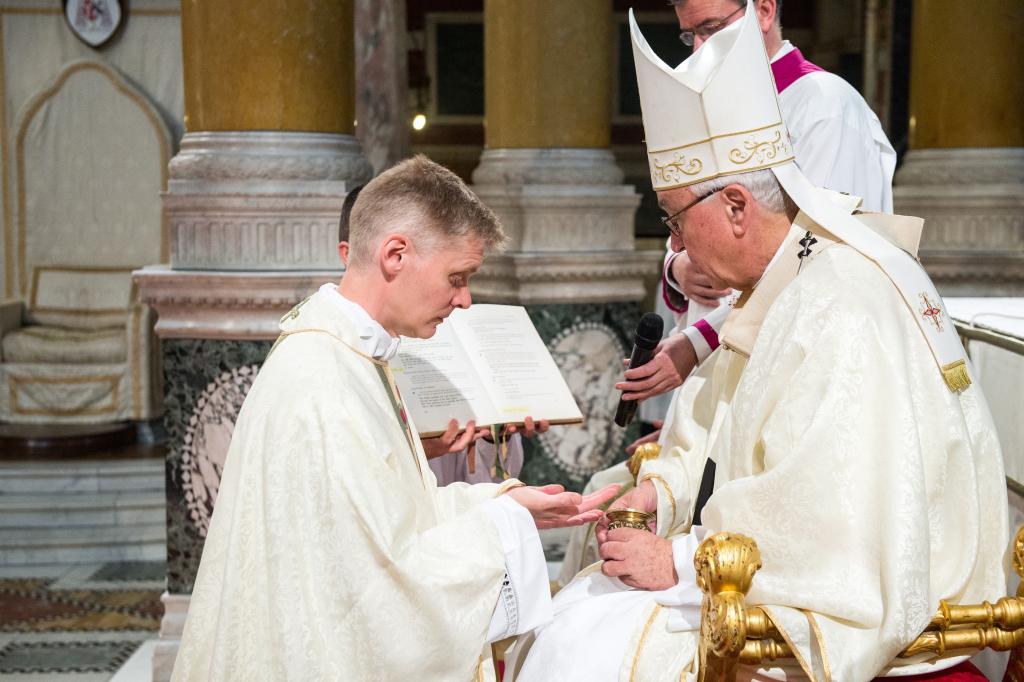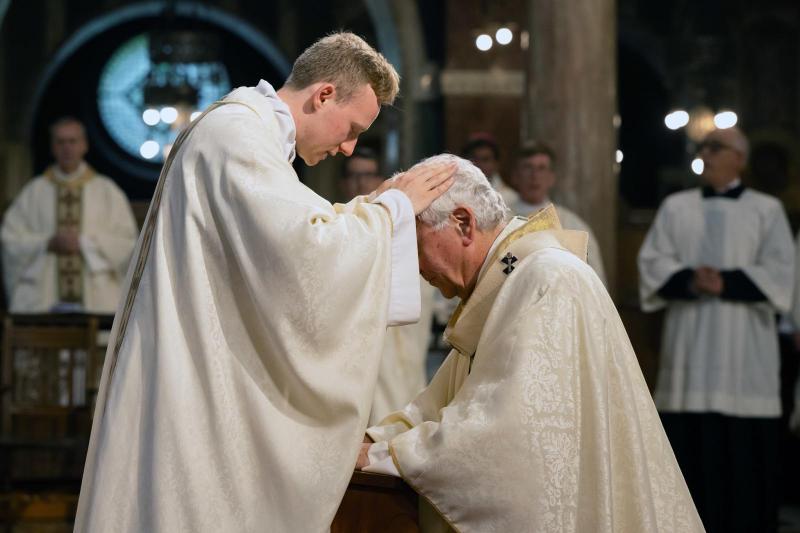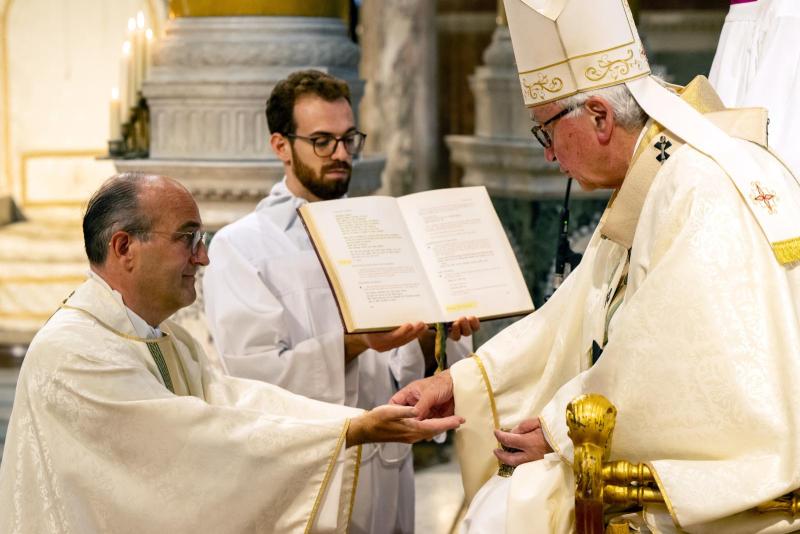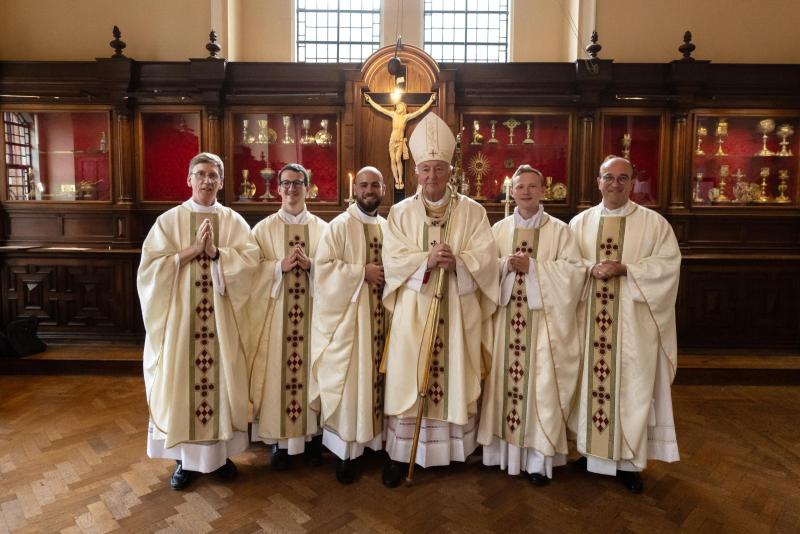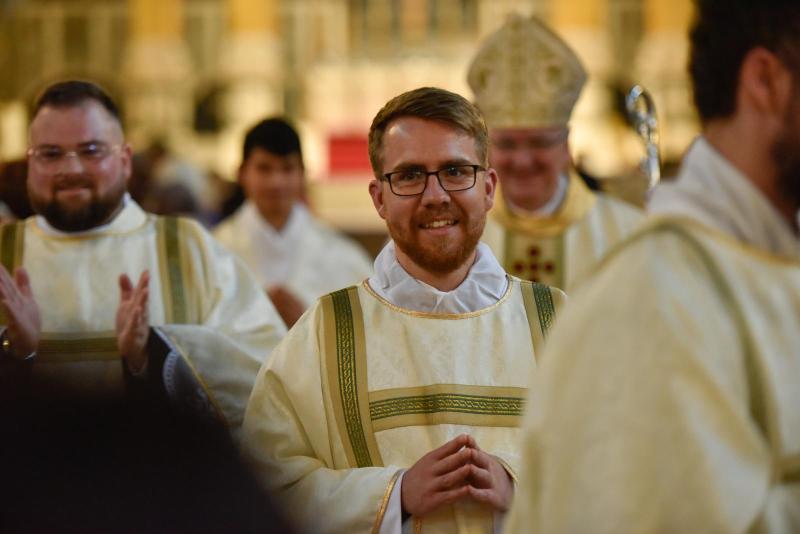Vocations Promoter Canon Stuart Wilson interviewed recently-ordained priest Fr Ben Woodley last autumn. They spoke about priesthood, St John Henry Newman and vocation. Here is how their conversation went.
Canon Stuart Wilson [SW] Congratulations on your ordination to the priesthood. Do you have one word to sum up what it felt like to be ordained to the priesthood?
Fr Ben Woodley [BW] Awesome. As the ordination Mass began I remember the instruction of the MC who said ‘Smile and go where you are sent.’ It felt like being in a waterfall and just being carried along by something inestimable and greater than myself. It was beautiful but also frighteningly powerful. It was awesome. I had been told ‘you will receive so much on that day that you must spend a lifetime letting it unpack itself within you’. Quite frankly, it was the happiest day of my life. I remember my parents when they came up to give me my vestments, I could feel my eyes welling up. My mother was crying. It was just so moving. Yes, a great day.
SW Can you tell us something about your background? What did you do before? What has been the most surprising or unexpected aspect?
BW I was baptised in the Anglican Church. I went to the Royal School of Music. I trained as a concert pianist; I also sang in choirs and directed choirs. I also worked for BUPA in various positions for a number of years.
The journey to Catholicism led me, unexpectedly, to become an Anglican monk at Alton Abbey in Hampshire. It was there that I began to read, and to realise that my feelings had a rational foundation too. After 20 months, I left and went to see the local Catholic priest, Fr Michael Markey. From August to April 2003, I joined the RCIA course and I became a Catholic at Easter that year. A great day for me was the Rite of Election in Westminster Cathedral with Cardinal Cormac [Murphy O’Connor]. As a Catholic, I was still quite interested in monastic life so I went to Ampleforth, but it became clear that I needed more time just living the Catholic life before discerning a vocation. I started working for BUPA. I was also involved in giving concerts and recitals in Staines, my home parish. In this time, Cardinal Newman was beatified and whilst Pope Benedict XVI was preaching at Cofton Park I remember thinking, ‘I’m still discerning a call and something is here’. After that, I contacted Fr Richard Nesbitt [then Vocations Director]. As a result, I went to seminary but I still didn’t have the clarity about whether to be in a monastery or a diocesan priest. Cardinal Vincent very kindly said ‘Ben, go and find out’. So I went off to Mount St Bernard and was there for nine months and I felt that the Lord made it very clear. When we look at the life of the Lord, Jesus spent time in the desert, and spent time in the market place. I came to realise that that was what the Lord was wanting from me. To be with him in the market place.
SW: Tell us to which parish you have been appointed. How has your first few months as a priest been?
BW: Our Lady, St John’s Wood. The first months after ordination were a holiday! I was with my parents in peaceful, beautiful and rural France. Now I’m in an urban city environment, in London. Overall, it has been quite a steep learning curve. An assistant priest performs so many different roles in quick succession. For me it is the indescribable, extraordinary, wonder of celebrating Mass. So beautiful to say the words of the Lord Jesus. I find it so inspiring to pour out myself in the liturgy for the people of God. They want to come to the sacraments, they want to go to Mass; they want to be given Christ and we want to give them Christ. It’s such a beautiful relationship. I hope that relationship will grow. We are priests for others, it’s an exhausting time but I know I need to relax, read and pray. I try to find myself praying wherever I am, willing God to be present and not just Ben Woodley who can so easily make a mess of things.
SW: Recently we were able to rejoice in the canonisation of Saint John Henry Newman. Has St JHN been an influence in your journey to priesthood?
BW: He has featured. As an Anglican monk, I remember picking up a book about him describing his path to being canonised. At that time, I walked round with his prayer card and thinking, well, if he did it, maybe there is something in this. I remember just looking at his portrait a lot and asking for his intercession. Each day I would use the prayer card. There was obviously a fascination with the man. He is such a luminous figure.
SW: Were you able to go to the canonisation? What do you think is the impact of the canonisation of Newman in the Catholic and wider Christian Church in England and Wales?
BW: I prayed the Novena in preparation. I find that when I read his works, I am always touched by his knowledge of scripture, philosophy and the Fathers of the Church. He is a beautiful thinker and I find his presence a great light. He has such a great pursuit of holiness and sanctity and he wants to share that with people. I think he is going to be such a valuable source. For a new English saint, we have such a gift here. As a priest, I was amazed to find that he was such a pastoral man. He always made time to visit, but his writing, his correspondence were impressive. I was told recently at a meeting that some people find it difficult to respond to emails, yet Cardinal Newman spent so many hours every day writing letters. It didn’t matter who you were. Every single person to him was someone made in the image and likeness of God. He cared about the growth of their sanctity. We have a deep responsibility to understand this man and to pray for his elevation as a Doctor of the Church.
SW: In what way do you think St JHN’s story and journey are relevant for discerning vocations?
BW: What I admire was how thorough he was in discerning his vocation. As he looked at the history of the Church, he wasn’t frightened in looking at difficult subjects. He would apply his intellect looking at so many different angles. St John Henry Newman didn’t make knee jerk responses. He always explained himself and brought together multiple strands of thought, so they could be seen as one. That’s why he can be so helpful when we are looking at vocations. We have to bring together so many aspects that have made up our lives.
SW: What other saints or other people inspired your call to the priesthood?
BW: St Benedict has been a stable and steady influence. I have been a novice/postulant in the Benedictine and Cistercian monasteries. For St Benedict work and prayer go together. He teaches us that utensils in the kitchen are to be just as important as utensils on the altar. There is no separation; all things combine well. St Benedict and his Lectio Divina where we read the scriptures slowly, continue to be a central part of my daily life.
Other inspiring people, I would say: Cardinal Basil Hume. I found his book Searching for God to be very inspiring and very holy. When I was confirmed, my name was Basil honouring both Basil of Caesarea and our late Cardinal whose face was a sermon – a homily.
SW: Can you tell us what you think are the most important aspects in your life and work as a priest?
BW: Prayer, reading and reflecting. The sense of God always at work in situations, in our mind and heart; our fears and strengths. Embracing them for others. Celebration of the Mass is important in the life and work of a priest. Hearing confessions. Hopefully we are able to help people discern Jesus’ understanding and to help them move forward. He never leaves us in the same place. If we can free people to become more fully human, I think that is heart of priesthood.
SW: Have you anything to say to those discerning the priesthood?
BW: Come to Westminster! Just be radically open with yourself. If you feel a sense that you are growing, that you are encouraged by others, then allow God into every aspect of your life. Ask that you may truly discern his good and holy will. Ask for the strength to carry on no matter how difficult it might be at times.
SW: Any regrets?
BW: I have no regrets. I am sorry it has taken me up to the age of 46. But then it’s not up to us, is it?
